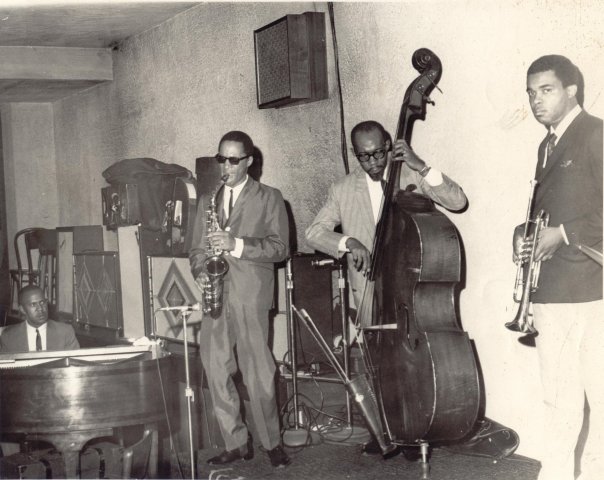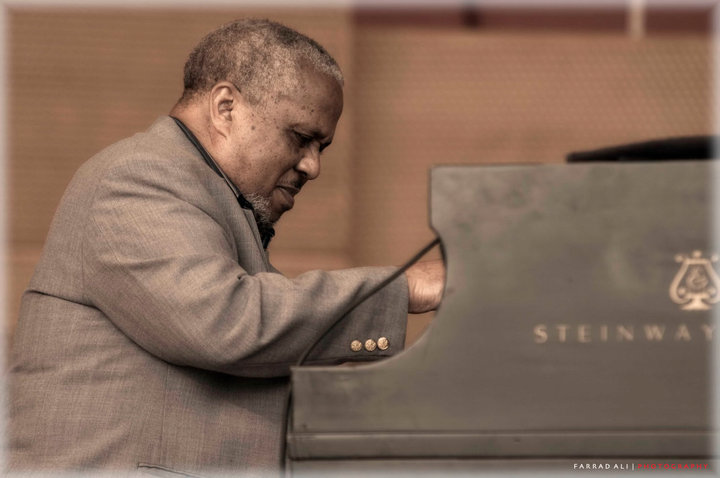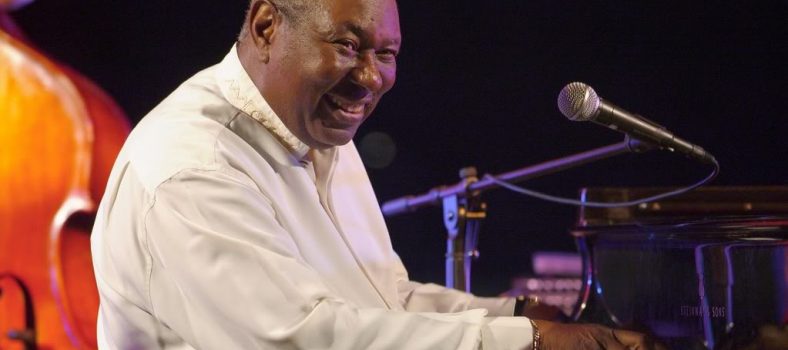And now I think the scene is as good as it has ever been. As far as musicians, we have a lot of great musicians; musicians have come here from other places. I am very proud of the musicians here in this city. – Willie Pickens
[The following is an edited version of a longer conversation]
Highly respected and supremely talented, Willie Pickens continues to advocate jazz music not just as a musician but as a passionate educator and mentor. His iconic career has led him to work with some of the best musicians in the business. Willie is well traveled, but he is firmly entrenched in the Chicago jazz scene. In this interview we discussed topics surrounding the significance of a jazz education to his thoughts on the evolution of jazz today. Willie Pickens will be performing live at the Jazz Showcase from July 18th – 22nd with trombonist Steve Turre. He will also return to the Showcase with his quartet on August 2nd – 5th. Willie Pickens will also play the Hyde Park Jazz Festival on September 29th, 2012.
iRJ: You are clearly a Chicago icon. You probably had a lot of offers to leave Chicago and go to New York. Why did you stay in Chicago?
WP: Well because, first of all I liked the city itself. And then I like the musicians that were here, they were very compatible. At the time I came here it was 1958 and you had a lot of great musicians. And I was very compatible with them and they welcomed me with open arms so to speak. Because I came from Milwaukee that was my home and I’d just finished the University of Wisconsin so I came over here and I had a job actually for about six weeks. That was the reason I came here. I had a bass player that was in Milwaukee who came here and had a job. And we worked together just bass and piano for about six weeks. Then after the six weeks I just stayed around. I was intending to go to New York or work my way gradually towards New York, but it was a fertile ground here as far as the music and the musicians. And very shortly I met my wife. We got married in 1959, so that was a year after I was here.
iRJ: Wow! So it seems to me like everything happened pretty quickly but, the way they should have I guess.
WP: Yes. And I am still married to the same woman.
iRJ: Congratulations! How many years?
WP: We’ve been married for 52 years! November 1st will be 53!
iRJ: You know, that makes my 8 years in October pale by comparison! Congratulations! I have a lot of work to do. [Laughter]
WP: I give my wife all the credit you know. When you are dealing with a musician, you have to put up with a lot.
iRJ: Yes. And my wife would say the same thing and I am not a musician! [Laughter] Perhaps they should talk some time! In your opinion, how has the jazz scene changed in Chicago? You’ve probably seen it do everything! How has it changed?
WP: Well I’ll tell you it has been through transformations. When I came here in the 50’s the scene was great. In the 60’s it was great. Then in the 70’s all the rock and roll came in and things went downhill from there. There wasn’t a lot of jazz. Then I have to say that Wynton Marsalis helped bring the focus back to the jazz scene in the 80’s and so as a result that was instrumental in helping Chicago too. And now I think the scene is as good as it has ever been. As far as musicians, we have a lot of great musicians; musicians have come here from other places. They talk about New York being the first city and Chicago being the second city, which is still true. But by the same token, I have to say that Chicago can pretty much hold its own. I am very proud of the musicians here in this city.
iRJ: You were once an educator; you taught in the Chicago Public School system, is that correct?
WP: I am still an educator! [Laughter] Yeah, I was in the public school system here for pretty close to 25 years. I was a high school band director, which I had to teach every instrument in the band because none of my students studied privately. So I had that task! And then I am still in education because I teach at Northern Illinois University I’ve been out there for 17 years. And then, I am also instrumental in running a program for Ravinia called “Jazz in the Schools” actually. We go to various high schools and we select various students, and we work with them. There are 9 of us working in this program. We call ourselves mentors. There is one for every instrument and actually we have 2 for Latin percussion so we have a person for drums, a person for saxophone, and a person for trumpet, guitar, bass and trombone. We worked with these kids from October through June and then we present them at Ravinia’s jazz festival. And this year we played on the 9th of June because Earth Wind and Fire was there. And the powers that be at Ravinia thought it would be good experience for our students to hear Earth Wind and Fire. So we’ve been doing that for 17 years! And a lot of our students have gone on to professional careers.
iRJ: Now as an educator, what do you feel is the importance or significance of a jazz education to students?
WP: Well, if they have an opportunity to study with the best in the business, I think it fosters their growth. They’re able to grow much faster. And I know when I came along there was nothing like this around jazz education. How we learned was on-the-job training, and by listening to recordings. There was no systemized method of instruction. Now we have all these jazz camps, we have all these method books and we have all these jazz educators; people that played that are teaching. Years ago they used to say you either teach or you played. That’s no longer true. People can play and teach and that’s what’s been going on for a number of years now.
iRJ: Let’s move towards to you and what you’ve done. How would you describe your style of jazz? What makes Willie Pickens?
WP: It’s very difficult to characterize it. But I would say its more mainstream, its straight-ahead jazz, like Charlie Parker, John Coltrane and Dizzy Gillespie and Herbie Hancock so to speak, sort of in that venue. Not too much on the free form style.
iRJ: Is there an artist that you would say is your favorite artist that you enjoy working with throughout your career?
WP: There are a number of people I enjoyed working with. Clark Terry was very instrumental in my career. Elvin Jones, I was with for almost 5 years. And then Louis Bellson, I worked with him. And Donald Harrison I worked with, he was one of the younger guys. And Bobby Watson I really enjoyed worked with. And Steve Turre the trombonist and shell man, so we have a compatible relationship. So I usually I have enjoyed everybody I’ve working with. I can’t really say a favorite. There’s something different from each musician.
iRJ: You‘ve used the word “compatible”. I’ve heard other musicians describe music as a “conversation”. Is that what you speak of when you say “compatible”?
WP: Yes. In other words, you blend well together. You are able to be on the same page. When you play together there is no disruption between your conversations. You seem to be able to maintain a compatible conversation! That’s what I think about when I think of it.
iRJ: Is there an artist that you haven’t worked with yet, that you’d like to work with?
WP: Off hand, there are so many artists. I never really think about who I’d like to work with. It just seems like they come to me. And another artist I thought of is Tom Herald. I’ve been working with him a lot. If fact I had him this past December, I hired him to play with me. I’ve been doing a jazz Christmas program for about 17 years now. I have a different artist each year. I’ve had Brantford…there have been so many I can’t remember all the people. I never had a manager or anything like that, so the jobs have just come to me and whatever comes is like an adventure. I go with the flow so….
iRJ: Right! That’s rare! Usually you hear that an artist has a manager. So you’ve managed your career yourself?
WP: Yes. I did a couple recordings actually on a Japanese label and they flew me to New York and I recorded with some of the best musicians. I remember George Mraz and Joe Farnsworth, who is a drummer and a bass player. And they put me with them. And I did one with David Williams and Lenny White. They sought me out, I didn’t seek them. So these things just happen. So when people ask me, I just say “God’s my manager”. [Laughter] That’s what I tell them!
iRJ: I think that’s fair! That’s very fair.
WP: That’s the only way I can put it because it’s nothing I have done to warrant this. I remember in my first really big exposure was with Eddie Harris in 1961. And he put out a recording called “Exodus to Jazz”. In jazz terms it was a hit. I had this elaborate introduction on the title track, which was “Exodus to Jazz”. So I had a classical intro before he started playing. And then he had put this kind of a beat to this “Exodus”. At that time the movie was out and he was doing things like that; a very inventive person. He was playing the saxophone tenor and a lot of people thought it was a soprano or alto because he playing way up about the normal range of the instrument. It was very creative; because he was using a baritone mouthpiece on a saxophone and a trumpet mouthpiece…he was doing exploratory things with the music and the instrument. So those are the type of situations I’ve been in.
iRJ: Was there someone who you would say influenced your career heavily? Who would that be?
WP: Influenced my career in what way?
iRJ: In other words, did you have someone that you modeled yourself after? Or where you just influenced by whatever you were studying at the time?
WP: Well, If you’re talking musical influences, I never really tried to copy anybody. But a person I admired and maybe sometimes if you don’t sit down and copy it, sometimes it subconsciously enters into your playing. People like Bud Powell and Art Tatum, those were the mainstream. At that time Bud Powell was a major influence in the 40’s which was my developing period. And then I heard Art Tatum when I was about nine, I said that sounds like more than one person playing. He was all over the piano…doing things that were outstanding. But then you have people like Oscar Peterson, Earl Garner…but I don’t sound like any of them. But I had listened to them. So it’s very difficult to say how I was influenced. If I was influenced it was subconsciously. I never sat down and tried to copy somebody note for note or nothing like that.
iRJ: And finally as an educator you’ve had a chance to influence the future of jazz by teaching and passing on the knowledge you have. Where do you think jazz is going as far as a genre?
WP: There are so many facets; people are doing so many things. In terms of pushing the envelope there’s a lot of pre-jazz. And then people are just expanding the parameters of jazz periods-it’s hard to say. You heard Charlie Parker; he was playing something that nobody had ever heard before. Even Dizzy Gillespie said that when he heard Charlie Parker. Then you had people like Coltrane; that was the next level of development…and then people like Cecil Taylor and all the other free form people. And then it is constantly evolving, and I think that’s what the music is supposed to do. So there are people who are combining jazz with Pop, R& B and Rap. So it’s very difficult to say where it’s going because there are so many people doing different things in this music. It’s going in many, many different directions.
By Mark Moore




